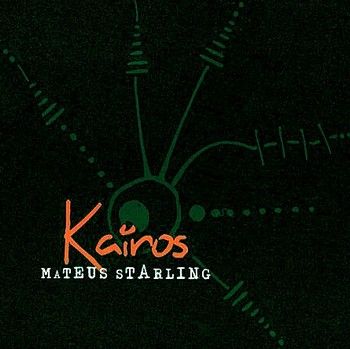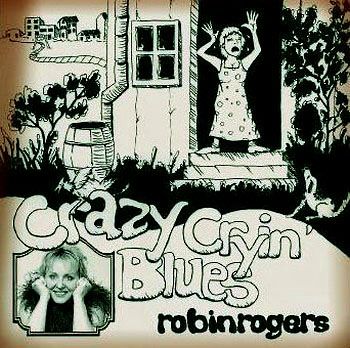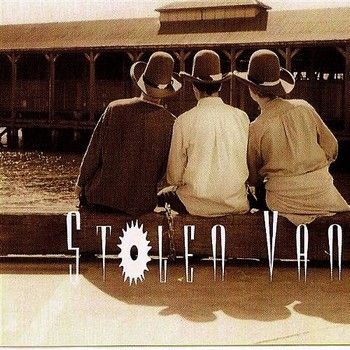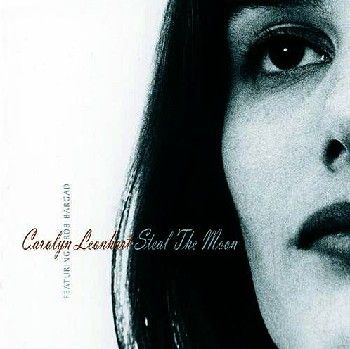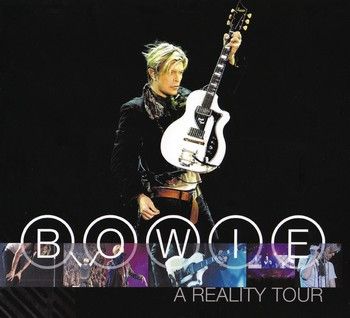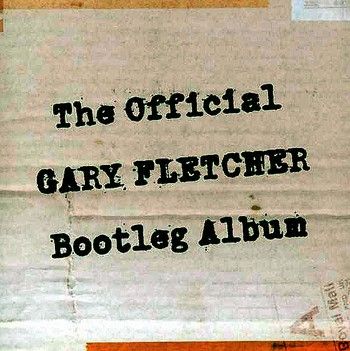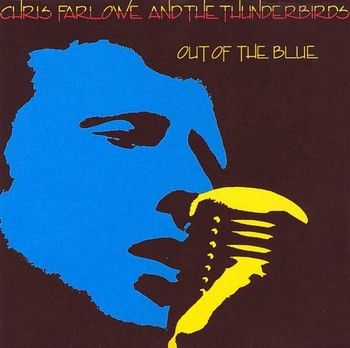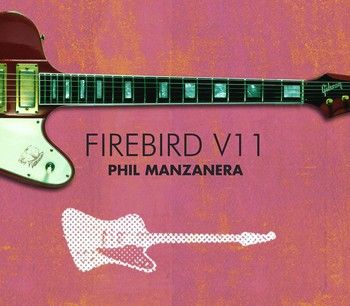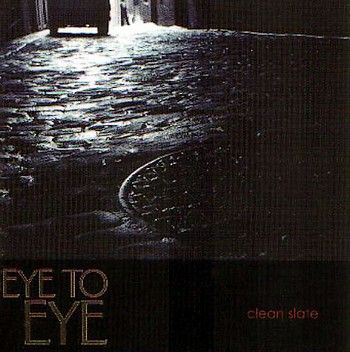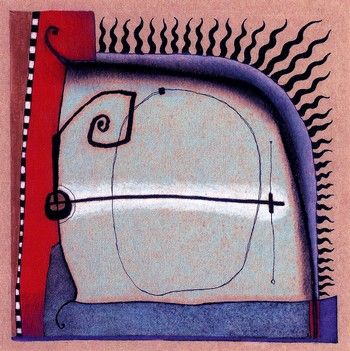 Rieflin-Fripp-Gunn - The Repercussions Of Angelic Behavior - 1999 - First World Music
Rieflin-Fripp-Gunn - The Repercussions Of Angelic Behavior - 1999 - First World Music
Fripp has recorded a lot of stuff. Almost like Miles Davis and John Coltrane, they spit albums out left and right, and that spit always ended up being high caliber stuff. What about this album? Is it essential Fripp? Just enjoyable? People like to compare apples and oranges. Let me just state that this recording falls in line solidly with the King Crimson ProjeKcts improv recordings. They are all the same style. So, you can't really rate against King Crimson's studio albums, or Fripp's Soundscapes/Frippertronics works, or the League of Gentlemen, because they are different. In this incarnation, the music is wholly improvised, and is somewhat extreme improvisation at that. This is not like what you'd expect from garden variety jazz improvisation, where they play the tune, solo improv upon the tune, and then return to the tune, or some permutation upon that. There is no tune. This is free. So, in a sense, this music resembles free jazz with a guitar/guitar synth/bass/drum lineup. Yes, King Crimson did a lot of improv in the past, but some of it ended up sounding quite composed or semi-composed anyway (e.g. "The Sheltering Sky") and when more free, still somewhat dissimilar from this stuff. The other main thing is concentration on texture over rhythm. Fripp's playing style here is less rhythm oriented than in some of his other stylistic incarnations. For the most part, he leaves the rhythm playing up to Rieflin and Gunn and adds a plethora of non-garden-variety, alien guitar textures. Rieflin and Gunn seem to find a groove at some point (after a little bit of ambient wandering before the coalescence) and sometimes stick to it, sometimes wander off, but always providing propulsion for the music. And Rieflin sounds like a rock drummer playing jazz (and Rieflin's unique spin on this style is worth the price alone). Fripp's guitar textures are usually guitar with various effects; there's the "echoey piano guitar" effect used to create ambience; there is the serpentine, buzz-saw sound which often seems like it has perverse background harmonics; a faster, manic style; and the drunken sampled organ/vibraphone style (I always thought it sounded drunken because you hear notes bend that don’t bend when played on the real instrument). I just got this CD, and have listened to it a couple times. It features all the same things that wowed me about the ProjeKcts recordings, with a difference in drumming though, and I wouldn't rate this any less essential than those. There you go. You have to have had your ears seasoned for improv though. Improv is a scary thing; the first time you meet it, it seems like its purpose in life is to appear purposeless. The more you expose yourself to it, the more it feels like an adventure (where are they going to take me with this tune?). Then when they throw out the tune altogether, it is just like waiting around for stuff to happen, and seeing if you like it. Which is good fun, for me at least. review by & © Heather Mackenzie — 2-14-03 © ground and sky 1999-2008 http://www.progreviews.com/reviews/display.php?rev=rfg-troab
The Repercussions of Angelic Behavior is a rock CD with atmospheric timbres. It is by Robert Fripp, Trey Gunn, and Bill Rieflin. The liner notes are sparse. In fact, they're nonexistent, so listeners have to tackle this disc with no "graphic interference." Fans of Fripp looking for a sound similar to his work with King Crimson will not be disappointed. The disc is loaded with hot guitar riffs and freaky dissonance. It is not pleasant and it is not unpleasant -- it is Fripp and it meets expectations. It is a new kind of avant-garde. © Jim Brenholts © 2011 Rovi Corporation. All Rights Reserved http://www.allmusic.com/album/the-repercussions-of-angelic-behavior-r444990
This 1999 release precedes the excellent new recording from perennial prog-rockers King Crimson, titled The ConstruKction of Light. Yet with The Repercussions of Angelic Behavior, electric guitarist and Crimson founder Robert Fripp, touch bassist Trey Gunn and hard hitting drummer Bill Rieflin mesh gears for some truly energetic interplay! Spearheaded by Fripp’s signature style attack consisting of loops, EFX, and sinuous lead soloing along with a keen (if not legendary) sense of the dynamic, the trio pursues booming, driving rhythms and abstract themes amid fiery improvisation and otherworldly effects. Throughout, touch bassist Trey Gunn displays the synergy and intuitiveness exhibited on recent collaborations with Fripp in King Crimson and elsewhere. - However, there are no track listings or credits while it is stated on the CD that – “random play is required for full effect”! And while Fripp and Gunn are well known for their improvising ways which has been documented on a rash of recent King Crimson offshoot recordings known as “Project X” or “Project I, 2 and so on, this release falls within a similar format. Hence, The Repercussions of Angelic Behavior is an engaging and electrifying presentation and while we won’t suggest that this recording is essential or a must have for Crimson fans, the overall experience is thoroughly satisfying. by & © Glenn Astarita Published: August 1, 2000 * * * ½ (out of * * * * *) © 2011 All About Jazz and/or contributing writer/visual artist. All rights reserved http://www.allaboutjazz.com/php/article.php?id=6060
An instrumental & improvisational album featuring King Crimson guitarist Robert Fripp, Chapman stick player and King Crimson member Trey Gunn & multi-instrumentalist Bill Rieflin, who played drums for Ministry from 1986-94. This album has been called "free metal space jazz". If you are familiar with the music of King Crimson and especially Robert Fripp, you will know what to expect. The usual "avant garde" tag has been stuck on this album by various "music critics" who half listen to one track before giving an "informed" opinion about the album. If you are willing to close your eyes and open your ears to some brilliant improvisational progressive rock/fusion music, then this album is really worth a listen. This album was not recorded to make money. Three brilliant musicians did not spend a lot of their time making this album for "the good of their health". It deserves to be taken seriously. Sometimes, "organized chaos" in music is refreshing, and is more rewarding in the long run than the rubbishy X-Factor type trashy music that is all too prevalent today. Listen to Robert Fripp's "No Pussyfooting" album, Trey Gunn's "One Thousand Years" album, Chris Connelly and Bill Rieflin's "Largo" album, and King Crimson's "Vrooom Vrooom" album. For music in the same genre listen to King Crimson's "ProjeKct One: Jazz Cafe Suite" album
[All tracks @ 192 Kbps: File size = 71.5 Mb]
TRACKS / COMPOSERS
1 Blast, Pt. 1 7:37
2 Blast, Pt. 2 3:39
3 Lost And Found Highway 8:48
4 Hootenanny At The Pink Pussycat 2:12
5 Brown Souffle 2:22
6 Heard, Not Seen 3:51
7 Last Stop 7:10
8 Re-Entry 4:05
9 Retarded (With Steam) 4:23
10 Strangers On A Train 9:24
All music composed by Robert Fripp, Trey Gunn, and Bill Rieflin
MUSICIANS
Bill Rieflin - Drums, Loops
Robert Fripp - Guitar, Soundscapes
Trey Gunn - Touch Guitar
ALBUM NOTE
A.is a live recording
B.is a studio record
C.is improvised
D.is composed
E.is a companion disc to Rieflin's 'Birth of a Giant'
F.is a companion disc to King Crimson's ProjeKct series
G.is an exciting and indispensable adventure into the musical unknown
H.is the medium for the release of the cover art
I.is considered in exactly the same way by Rieflin, Fripp, and Gunn alike
J.is a source of differing opinions between Rieflin, Fripp, and Gunn
K.all of the above
L.some of the above
M.none of the above
Everything on this record is intentional. Except where not. Note: Random play is required for full effect
ABOUT TREY GUNN (WIKI)
A native Texan who now resides in Seattle, Washington, Gunn began his musical life at the age of seven playing classical piano. His interest in music grew through various instruments: electric bass, electric and acoustic guitar, keyboards, and the touch guitar. He moved to Eugene, Oregon, and played in punk bands while he completed a degree in classical music composition at the University of Oregon.[1] He then moved to New York City where his professional career began. He spent some time as a student of Guitar Craft with founder Robert Fripp and appeared on several Robert Fripp and the League of Crafty Guitarists recordings. From 1988 to 1991, he toured playing Chapman Stick in the UK and Europe, with Toyah Willcox, Robert Fripp and Paul Beavis, at first under the band project name "Fripp, Fripp" who by the second tour became "Sunday All Over the World". They recorded and released one album in 1991 entitled Kneeling At the Shrine. In the same year and with the SAOTW line up, he also played stick on the solo Toyah album Ophelia's Shadow, produced by Toyah who was to later guest on his album, The Third Star. In 1992, he was asked to join David Sylvian and Robert Fripp in a collaborative project that toured the United States, Europe and Japan. The band released The First Day and Damage — a live recording from the Royal Albert Hall in London. During this period Gunn also recorded his first solo album One Thousand Years. In 1994, Gunn joined King Crimson. With King Crimson he played Chapman Stick and subsequently diverse types of Warr guitar and was part of the "double trio" formation opposite Tony Levin. In 1997, King Crimson fragmented into smaller configurations known as the ProjeKcts. Gunn, along with Fripp, participated in all of the ProjeKcts performances and recordings. In 1999, the group mutated into a four piece — Belew, Fripp, Gunn and Mastelotto. He left Crimson after "The Power to Believe" tour in 2003. Over the course of his decade with the group he participated in thirty-three King Crimson CDs, two DVDs and hundreds of performances. He has also performed and recorded with a number of other musicians: Tool, Puscifer, Robert Fripp, Sean Malone and Gordian Knot, David Sylvian, Vernon Reid, John Paul Jones, Eric Johnson, Italian singer Alice, Azam Ali, Matt Chamberlain, Michael Brook, Bill Rieflin, David Hykes of the Harmonic Choir and many more. He has released a number of solo albums, as Trey Gunn and as the leader of The Trey Gunn Band. Years of working with broad-necked instruments like the Warr guiar affected Gunn physically and he had to seek less abusive outlets for his artistic expression."Trey Gunn interviews on Outsight Radio Hours". http://www.archive.org/details/TreyGunnInterviewsOnOutsightRadioHours. In 2003, Gunn founded the multi-media group Quodia with Joe Mendelson where he contributed more vocals than in previous projects and less Warr guitar. In 2004, he and Pat Mastelotto started collaborating with Kimmo Pohjonen and Samuli Kosminen, forming KTU out of their respective duos TU and Kluster. In 2007, he began working with Eddie Jobson in the group UKZ. In addition to helping run a collective music label based in Seattle called First World (FWD) and a multi-media production company (7 Directions), he is currently dividing his time between his solo work, film and television scoring, music supervising, and building multi-dimensional media projects.
ABOUT BILL RIEFLIN (WIKI)
William "Bill" Rieflin (born September 30, 1960) is an American musician, most active as a drummer and currently playing with R.E.M.. In the past, Reiflin has worked with many notable groups in the industrial rock, experimental metal and related genres, including Ministry, the Revolting Cocks, Lard, KMFDM, Pigface, Swans, Chris Connelly, Nine Inch Nails and many others. Rieflin lives in Seattle, is married to the artist Francesca Sundsten, and is one of the founders of the independent music label First World Music. Rieflin began his professional career in his hometown of Seattle. In 1975, he was The Telepaths, a band which played backup for a couple of live gigs by the pre-The Screamers band The Tupperwares. He played drums for The Blackouts starting in 1979. His bandmates included his brother Raymond, Paul Barker, Roland Barker and Erich Werner. Eventually that band dissolved and Paul Barker joined the nascent Ministry. Rieflin's earliest collaboration with Al Jourgensen was on the second single by the Revolting Cocks, You Often Forget. Later, he participated in the creation of Ministry's ground-breaking album The Land of Rape and Honey. He was noted for his performance in the live video In Case You Didn't Feel Like Showing Up (Live), which featured not only his precision percussion (alongside fellow drummer Martin Atkins), but Rieflin's genteel fashion sense. His work with Ministry and its side projects lasted through to the mid-Nineties, though he notes that he was never credited as a member of Ministry proper, always as an "other" musician. Therefore, when he parted ways with the band during the Filth Pig sessions, he didn't really quit since he was never an official member. Rieflin helped Atkins kick off Pigface, the industrial collective that would grow to incorporate hundreds of artists, formed a friendship with labelmate Chris Connelly and founded First World Music. Like Connelly, Rieflin's work has grown beyond his industrial roots. They have collaborated on several recordings; two in particular, The Ultimate Seaside Companion (as "The Bells") and Largo, showcase Rieflin's frequently overlooked keyboard skills.Living in Seattle gave Rieflin the opportunity to build relationships with other prominent musicians including Robert Fripp and Trey Gunn of King Crimson, Scott McCaughey of the Young Fresh Fellows, Sascha Konietzko of KMFDM and Peter Buck of R.E.M. Fripp contributed to Rieflin's solo debut, Birth of a Giant, which also featured Rieflin singing in something other than a background role. Improvisations from these sessions turned up later on the CD The Repercussions of Angelic Behavior. Rieflin appeared on all KMFDM records released from 1995–2003 as a drummer, programmer, vocalist and keyboardist. He toured with the band as a bassist in 2002 in support of its comeback album, Attak. He also drummed for McCaughey's band, The Minus 5, which occasionally included Peter Buck. Eventually Buck offered Rieflin the opportunity to sit in with R.E.M., who were missing a permanent drummer since the 1997 departure of Bill Berry. The band gave him the live drummer slot in its 2003 tour. They later announced that Rieflin would fill the role indefinitely, though once again as an "other" musician rather than as an official member. Recently Rieflin has contributed bouzouki, keyboards and guitars to the group too. Rieflin maintained a weblog through the end of 2004. In it, he ruminated on his day-to-day doings and mental state, recounted the exploits of his two cats, Pim and the Egg, and obliquely referred to his fellow musicians. Rieflin is involved in a music collaboration project entitled The Humans, which consists of him, Chris Wong, Robert Fripp and Toyah Willcox. The band performed a series of live dates in Estonia in Autumn 2007 and 2009, and released their debut album We are the Humans on May 1, 2009.Rieflin contributed to the Swans' 2010 album My Father Will Guide Me up a Rope to the Sky and the upcoming KMFDM album, WTF?!, which is to be released in 2011.
ABOUT ROBERT FRIPP
Throughout his career, guitarist Robert Fripp has continually pushed the boundaries of pop music, as well as pursuing many avant-garde and experimental musical ideas. Fripp began playing professionally with the League of Gentlemen in the mid-'60s, providing instrumental support to many American singers who were touring England. During this time he began Giles, Giles and Fripp with Pete and Mike Giles. The trio only released one album, 1968's The Cheerful Insanity of Giles, Giles and Fripp, yet the group soon evolved into King Crimson. Following the release of their 1969 debut album, In the Court of the Crimson King, King Crimson became one of the most respected progressive rock acts of its era. From 1969 to 1974, Fripp was the one mainstay in the group, leading it through its various musical incarnations. During this time, he pursued several side projects away from King Crimson. Fripp recorded two albums with Brian Eno: No Pussyfooting (1972) and Evening Star (1974). Both of the albums featured the musicians experimenting with avant-garde techniques, including Fripp's "Frippertronics." Frippertronics featured layers of guitars and tape loops, producing a harmonically rich, humming sound; it became a familiar sound on his records. Fripp also produced a handful of albums, mainly records by experimental jazz outfits. In 1974, Fripp disbanded King Crimson and retired from music. Three years later, he returned to the business, playing on David Bowie's "Heroes." Soon afterward, he produced and played on Peter Gabriel's second self-titled album, as well as Daryl Hall's Sacred Songs. Fripp released his first solo album, Exposure, in 1979. God Save the Queen/Under Heavy Manner appeared the following year and in 1981, he assembled a new lineup of King Crimson. While that band recorded and performed, he also led a new band which borrowed its name from his first group, the League of Gentlemen. After releasing three albums, the new version of King Crimson broke up in 1984; The League of Gentlemen split soon afterward. Fripp released God Save the King in 1985 and began teaching guitar, dubbing his students and school the League of Crafty Guitarists; he released an album recorded with his Crafty Guitarists in 1986, the same year he released the first of two collaborations with his wife, Toyah Wilcox. Fripp re-formed the '80s lineup of King Crimson in late 1994, releasing Thrak in 1995. He returned to recording solo in 1997, releasing That Which Passes. © Stephen Thomas Erlewine © 2011 Rovi Corporation. All Rights Reserved http://www.allmusic.com/artist/robert-fripp-p77998/biography
